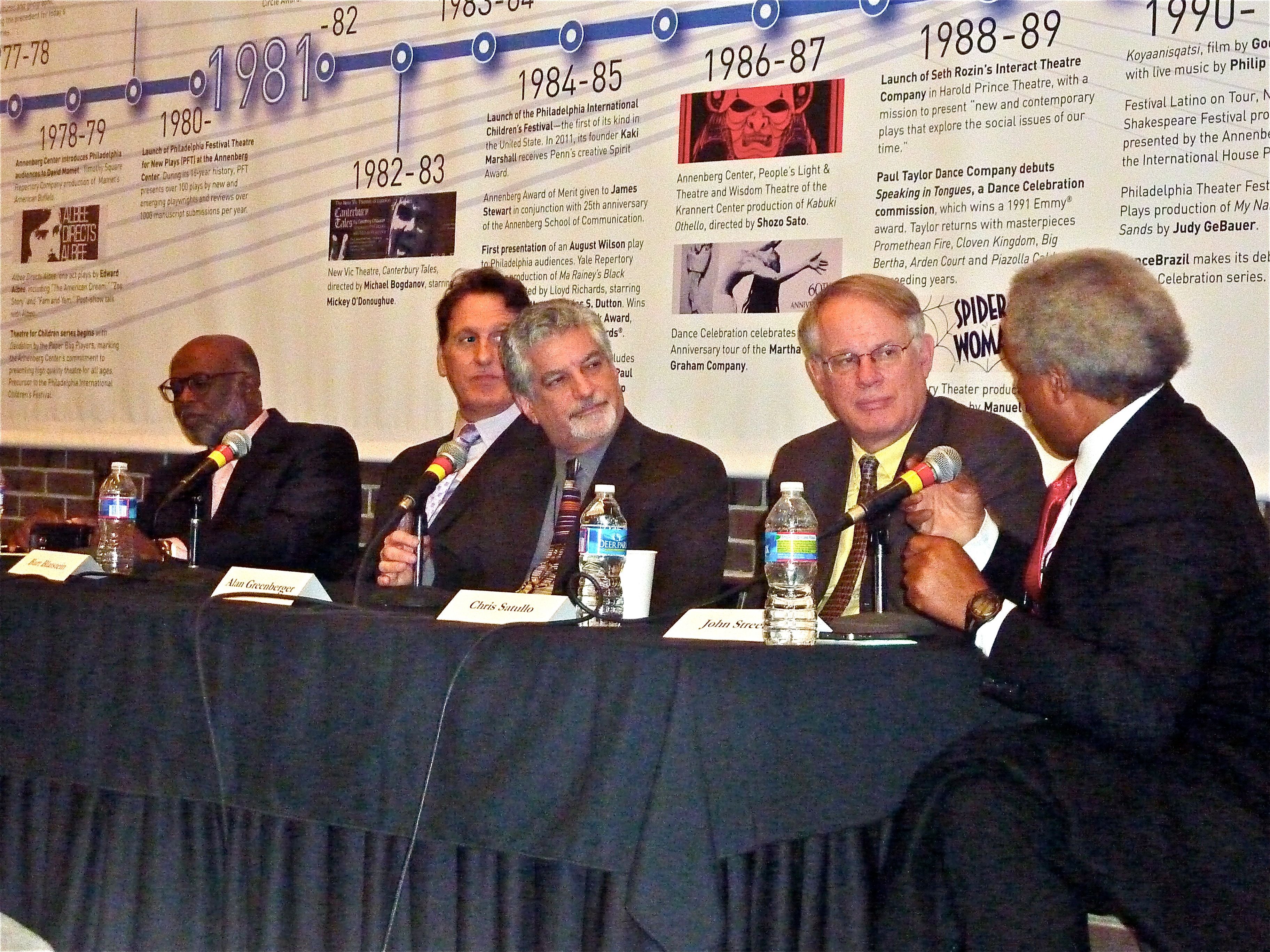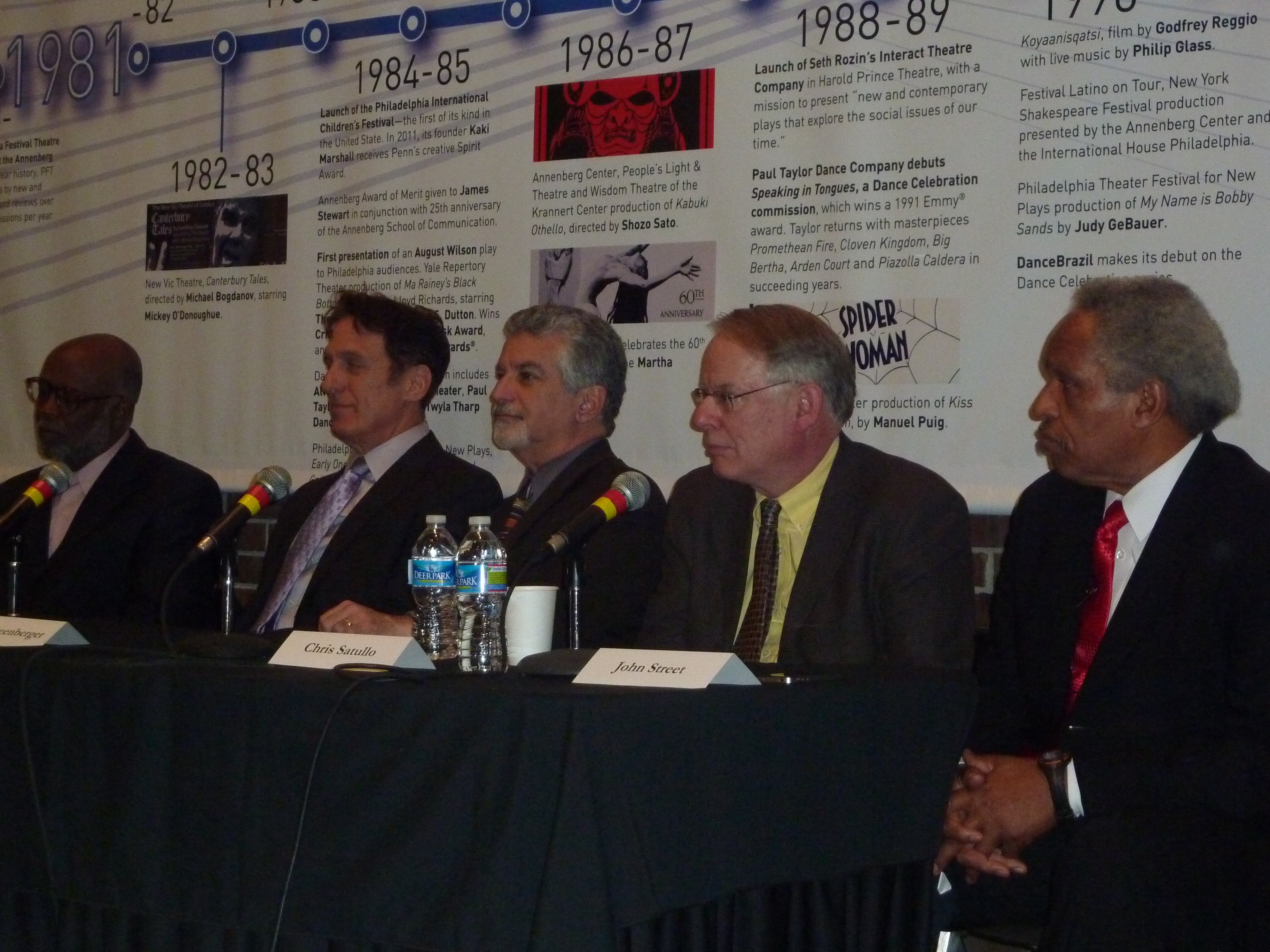Megaprojects: Can’t we all just get along?
The “other side” got its due Tuesday night as the weeks devoted to the Annenberg Center for the Performing Arts presentation of In the Footprint: The Battle over Atlantic Yards, came to a conclusion. Prompted by the dramatic story of the drawn-out development of a 22-acre, $4 billion plot in Brooklyn, the presentation asked: Megaprojects: Can we balance individual and social good?
Although one audience member immediately questioned the absence of any community representative on the assembled panel, it seemed a fitting retort to the play, which was told primarily through the — widely diverging — viewpoints of residents and activists. For this round, players from Bart Blatstein to ex-Mayor John Street had their say.
Moderator Heshimu Jaramoji got the ball rolling by asking each of the four panelists to name the role in the play that they most identified with. Deputy Mayor Alan Greenberger humorously mused that the “hard-pressed public official whose job it is to make sense of conflicting views” was absent from the work.
But his comment served as a good opportunity for both the panelists and the audience to embark on a discussion centered on the importance of communication during megaprojects. Done properly from the beginning, such efforts might have resulted in people “feeling a bit more patient, more trusting of the process,” observed Chris Satullo, Executive Director of News and Civic Dialogue at WHYY.
“More important than talking with people, is listening to them,” Blatstein added. “It’s a lot of hard work, but when reasonable people get together, things can be worked out.”
“Thanks for the supermarket,” someone shouted from the audience in response, referring to the recent opening of a SuperFresh in Blatstein’s latest Northern Liberties development.
Mayor Street brought up the issue of constant complainers, saying “some people are just against stuff” before evoking the adage “a man convinced against his will is of the same opinion still.” Part of the job of elected officials is to try to work through all of the varying points of view, he said.
Greenberger expanded on the question of automatic naysaying. “There’s a huge gap between what people think before a project and after it’s there. . . . The way we understand the physical world when it’s there is very different than when we’re just talking about it.”
From the audience, Harris Sokoloff, director of the Penn Project for Civic Engagement, asked if the public input should, then, be ignored. The panel vigorously denied that, with Blatstein saying that such input “works well when it’s moderated and as long as there’s mutual respect on all sides.”
Leaders need to consider what they hear, make a decision, “get yelled at” and then, “hopefully, when the thing comes out, it turns out not as bad as the rhetoric would have had you believe,” Greenberger summed up.
“At some point in time, the decision has to be made,” echoed Mayor Street. “Progress has to be made.”
A brief but disjointed discussion on eminent domain followed, with panelists and audience members kicking around whether or not private entities were entitled to take advantage of it. Mayor Street offered several examples where his administration had been approached to ease development. In one instance, he reported, he told one developer, “if you want the property, buy it,” adding, “and so, no more campaign contributions from them.”
In general, he said, “it’s not our [the municipality’s] job to do site work for private developers.”
If such a project as Atlantic Yards — call it Schuylkill Yards — were to arise here, how would it play out? posited one audience member. Greenberger suggested our “Quaker DNA” might evidence a “better underlying ability to talk to each other. I think that would help, there would be more civil discourse.”
Satullo added that he thought “even as wasted away” as The Inquirer now is, it would have given much better coverage to such a development than had The New York Times.
Mayor Street ended the evening with a non sequitur, pointing out that as hard as it was for him to admit, he would be rooting for the New York Giants in this weekend’s Super Bowl.
Contact the reporter at jgreco@planphilly.com and follow her on Twitter @joanngreco
WHYY is your source for fact-based, in-depth journalism and information. As a nonprofit organization, we rely on financial support from readers like you. Please give today.








